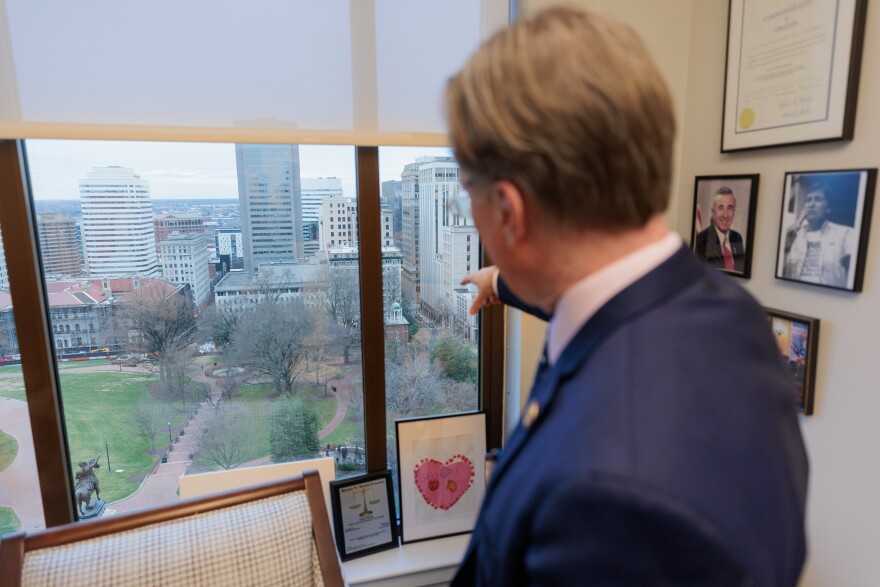Virginia lawmakers could order the state government to take a closer look at the litter tax this year.
House Joint Resolution 35, sponsored by Del. Paul Krizek (D–Fairfax), would order the departments of Taxation and Environmental Quality to lead a study on solid waste and recycling streams, market conditions and economic opportunities for recycling, and the potential effects of adjusting the tax for inflation.
The resolution references a 2023 study by Clean Virginia Waterways, a statewide nonprofit based at Longwood University, which found that Virginia localities bring in the least revenue from the litter tax than any other state with a similar policy.
The litter tax is a yearly flat fee that producers, distributors and retailers of commonly littered items have been required to pay since it was approved by the General Assembly in 1976. Companies selling groceries, soft drinks, carbonated waters, beer and other malt beverages are charged an additional fee.
It’s only been adjusted once — through a 2020 bill by Del. Alfonso Lopez (D–Arlington) that doubled the base and additional fees to $20 and $30, respectively. CVW executive director Zach Huntington said that increase lags far behind rates of inflation since ’76.
“Had those rates been automatically adjusted to tie with inflation, they would be $37 and $73 right now,” Huntington said.
The current rate also lags behind the 744% increase in plastic production between 1976 and 2023, according to CVW.
In 2023, Virginia generated $3.2 million in litter tax revenue, and CVW’s study found that localities use the money they get efficiently.

“Whether it's a couple thousand dollars and they're able to put cigarette receptacles at their county parks,” Huntington said, “or if it's a place that gets more money, they're able to actually fund robust community cleanup programs that have hundreds, if not thousands, of volunteers.”
Fairfax County, as the most populated Virginia locality, brings in the most cash: $207,460.20, according to 2023 DEQ data. It uses the money to help fund Clean Fairfax, which runs cleanups that attract thousands of volunteers over the course of a year, monitors stream pollution, organizes public outreach and more.
Huntington mentioned a spring 2022 CVW survey of over 900 registered Virginia voters in which 71% of respondents said they’d support shifting the cost of recycling programs from taxpayers onto producers of single-use plastics and other commonly littered items. Seventy-six percent said they’d support policies requiring less plastic packaging.
Although he sees the litter tax as necessary to fighting plastic pollution, Huntington said it would be most effective as one program in a multipronged approach. The tax mostly provides revenue for cleanup programs, but Huntington said recycling programs in the state are underfunded, too.
“We’ve got a real problem with litter,” said resolution sponsor Krizek.
Krizek said his proposal would help legislators get a handle on a complicated issue. It would give a sense of the cleanup efforts that localities could engage in if they had more funding. The legislation would also require an analysis of what currently ends up in Virginia recycling streams and take a closer look at what localities can do with their recycled goods.
“Identifying markets for our recyclable products, especially the true ones — aluminum, cardboard, glass — is extremely important,” Huntington said.
Litter cleanup and recycling are two pieces of the approach to reducing pollution, Huntington said. Another important piece is reducing the amount of plastic entering the waste stream.
“Recycling is a cyclical process, right? It's like [turning] an aluminum can into an aluminum can,” Huntington said. “When we're dealing with these plastics, we're down-cycling them. So, a plastic bottle is becoming things like composite decking, benches, carpets. And then once it's made into these new materials, it's then sent to a landfill [or] a waste-to-energy site.”
Virginia does have some other policies designed to reduce pollution. Restaurants will be required to phase out expanded polystyrene containers by 2028 or 2030. That requirement would have taken effect last year but was delayed in the 2022 state budget.
Some Virginia localities have implemented a plastic bag tax, after a 2020 law gave them that authority. Clean Fairfax reported a 50% decrease in plastic bags found during quarterly stream monitoring in the year after the county passed its five-cent bag fee.
Krizek said he has not seen a fiscal impact statement for his current resolution.
The bill will be heard by the House Rules committee, which meets “on the call” of House Speaker Don Scott. Scott’s office has not yet scheduled any meetings for the committee.



